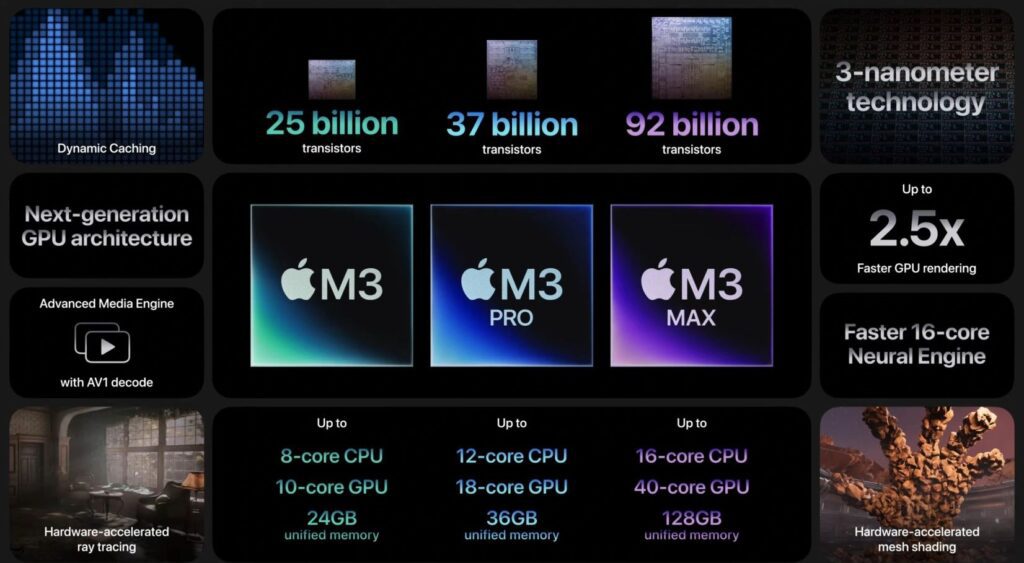Your cart is currently empty!
Apple’s M3 processor further powers a paradigm shift in the processor industry that should worry Intel
Posted by
–
Apple today announced the latest family of M3 processors and recently Qualcomm announced Snapdragon X Elite. This is a paradigm shift in the chipset industry for personal computing devices. MediaTek the third chipset player in the space, I am sure will follow the pursuit and introduce a premium chipset for high-end laptops anytime soon. This would be a complete takeover of the personal computing processor market that has been dominated by Intel for years. A big change!
Apple M3 Chipset

Well before I talk more about this tectonic shift in the silicon industry, lets first discuss Apple’s silicon launches of the day. Apple always surprises everyone in the industry. Is Apple a hardware company? Is Apple a software company? Is Apple an ecosystem company? While we were always having such discussions within the tech communities, now we have another avatar of Apple which is only getting better – the silicon maker. The M chipset of Apple is not just emerging another chipset for computing devices like laptops and all-in-ones, but it has some become an innovation platform that is bringing many new things to the industry. For instance, for the first time ever, there is Dynamic Caching GPU which will dynamically adjust the memory resources as per the task. So heavy tasks get more memory allocated.
There are several parameters where Apple’s M3 silicon surpasses so many industry benchmarks and standards. The energy efficiency in this chipset edition is taken to next levels. The laptops powered with M3 silicon can give up to 22 hours of battery life. We can keep going on to discuss about such features in the latest chipset announcement from Apple.
The paradigm shift
Both the recent releases of Snapdragon X Elite and now Apple M3 have given laptop industry very powerful silicon that not only adds incredible performance to the existing tasks including heavy lifting applications like video processing, gaming, etc., but also brings in very powerful neural computational capabilities that will make it easy for the laptop makers to incorporate AI based solutions and applications besides taking edge computing to next levels.
Together Apple, Qualcomm and MediaTek are fast invading Intel’s dominating territory. Intel could never successfully bring its tech supremacy to mobile devices by creating an acceptable silicon solution for the smartphone industry that essentially would be an offshoot of its processors for laptops and PCs. But, Apple, Qualcomm and MediaTek are very effectively doing the reverse. They are boldly moving towards laptops from smartphones. This also goes great with consumers as predominantly users are exposed to the performances of the chipsets of these companies through their 1st computing device – a smartphone. So, they can very well connect the experience they are likely to get using a laptop powered by the same silicon maker.
The low power processor has always been a complex puzzle for Intel to solve. Beyond Laptops and some of the Tablet PCs, Intel could never make it to a reputable level. Even though they have a complete IOT portfolio, the consumer IOT is an absent space for Intel. The low power success story of Apple, Qualcomm and MediaTek is opening up immense potential for them. They are not only redefining the laptops making them energy efficient, but also becoming preferred silicon choice for OEMs in IOT as well. Apple though remains a closed ecosystem and all its silicon goes to proprietary products. Qualcomm and MediaTek have great prospects in IOT to power billions of products in the future.
This omnipresence of Qualcomm and MediaTek along with Apple making its own closed through and through ecosystem is something that should concern primarily Intel as well as others like AMD.
The present emerging building blocks of technology – 5G, AI and Edge computing are all check boxed for Apple, Qualcomm and MediaTek. Though for now Intel seems to be enjoying its strong positioning within the server grade processors, this development should ring the bells at Intel.




